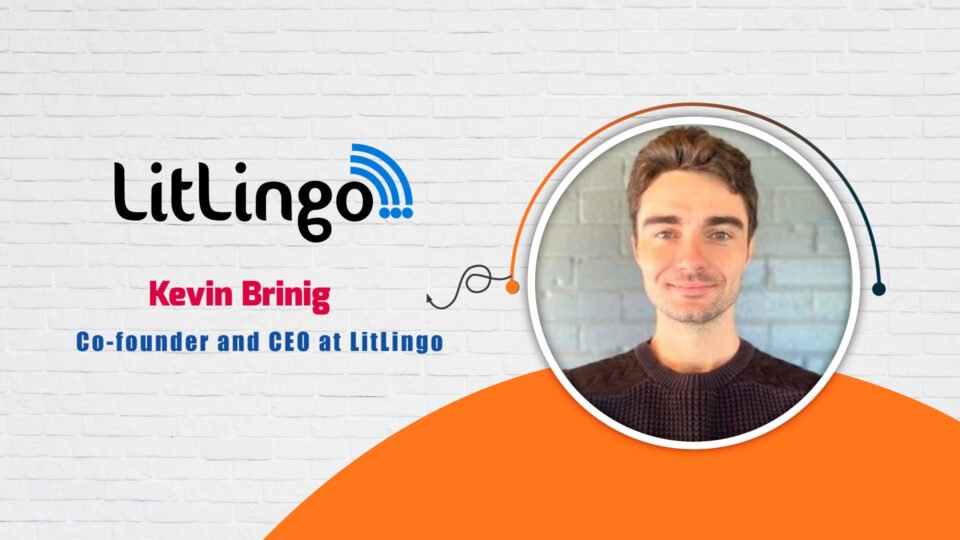Kevin Brinig, co-founder and CEO at AI-driven software LitLingo discusses how it ensures compliance in business communications and mitigates risks
1. Tell us how you came to be the Co-founder and CEO at LitLingo?
My co-founder, Todd Sifleet, and I noticed that as a company grows the processes by which it maintains compliance with industry and company measures quickly fail. You can’t train people or integrate them into your company culture fast enough when you hire hundreds of people per month. Processes don’t scale as fast as technology.
Much of that failure comes in the way employees and management write, whether it’s in their emails, company materials or messaging apps. We saw an opportunity to create an application that helps stop these mistakes before they happen and to help improve company cultures in the process. As a result, we’ve created an AI-powered software that watches for risk and errors within business communications platforms such as office chats, email and customer service ticketing.
2. Why did you choose your tech venture to be in the artificial intelligence space?
When you take a look at where AI was just three or four years ago compared to today, its worlds apart. It’s very clear that there will be companies that take advantage of the growth in AI and there are companies that will miss out. We’d like to help the innovators of the group succeed as best we can.
3. What are some of the industrial sectors that LitLingo caters to?
We work with companies across the spectrum – technology, financial services, media and publishing, logistics, you name it.
4. How did you define the vision of LitLingo? What was your initial strategy for setting up as a co-founder and CEO?
The vision of LitLingo is to help companies operate more efficiently. A large component of that is helping companies define, build, and perfect culture and communication. To accomplish that goal, you need analytics, insights, guardrails, and scale.
5. What are some of the unique lessons you have learned from your customers being the CEO at LitLingo?
People are fundamentally good. They want to do the right thing and they want to solve problems with you.
It has been an incredible experience growing with our customers and working with them to solve problems that can’t be solved in a vacuum.
6. How is LitLingo planning to use the recent $2 million funding?
We are investing in our product. There is so much opportunity in front of us and we need to stay ahead of the curve. For example, improving our models and improving our real-time risk insights products.
7. Can you tell us how businesses can benefit by integrating LitLingo into their existing systems?
Modern companies create massive amounts of data – whether its customers that are communicating with the business or whether the employees are communicating with each other or the employees communicating with external entities.
Historically, there has been no way to easily operate on this data – it’s unstructured, hard to access, and fleeting. However, there is so much information hidden within this data that companies can’t easily access. LitLingo allows our customers to gain insights from this treasure trove and take action in real time.
Once customers begin to understand how to leverage their data, then the world is their oyster – they can increase their sales, decrease their costs, re-prioritize product development, or improve their culture.
8. How does LitLingo analyze real-time employee communications?
LitLingo integrates with the applications that companies already use (email, digital chat, and customer service platforms) and is able to evaluate communications in real time. This allows us to provide near-instantaneous insights into the inner workings of your business.
The system can tell you if a specific customer is interested in spending more with you or if there are product features that would make your offering more valuable or if a specific sub-org is creating unnecessary liabilities. This is the data-driven approach that will make certain companies successful, while others are stuck in the past.
9. How do you keep pace with the rapidly changing tech space?
Austin is an incredible place to start a company. We’re also constantly connecting with our incredible partners across the country, sharing ideas, and strategies.
When you’re working in a space that’s moving as quickly as AI/NLU, the landscape changes every day and that actually makes it easier to evolve, because those changes are so exciting that they get shared by the passionate people in the space.
10. Can you give us a sneak peek into some of the upcoming product upgrades that your customers can look forward to?
We’re working on some exciting partnerships that will give more access to customers in new industries.
11. What would be the one AI breakthrough that you would be on the lookout for this year?
I think the biggest breakthrough this year will relate to corporate culture. You will start to see companies react to remote working conditions and
AI will be a must-have tool in the toolbox for working remotely. In the past, companies have had “Head of Facilities” roles, but we’ll begin to see “Head of Remote” and those individuals will outperform if they take advantage of technology.
12. What is the one leadership motto you live by?
I think the last stanza of the poem “If” by Rudyard Kipling offers a good example of how to lead.
If you can talk with crowds and keep your virtue,
Or walk with kings – nor lose the common touch,
If neither foes nor loving friends can hurt you,
If all men count with you, but none too much;
If you can fill the unforgiving minute,
With sixty seconds’ worth of distance run,
Yours is the Earth and everything that’s in it,
And – which is more – you’ll be a Man, my son!

